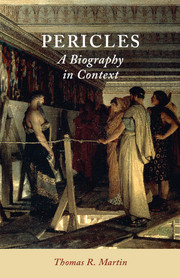Book contents
- Frontmatter
- Dedication
- Epigraph
- Contents
- List of Illustrations
- List of Maps
- Acknowledgments
- Chronology
- Pericles' Alcmeonid Family Tree
- Introduction: A Biography of Pericles in the Context of the Ancient Sources
- 1 The Notorious Family History of Pericles' Mother
- 2 The Harsh Lessons of the Career of Pericles' Father
- 3 Pericles Becomes a Teenager during a Family Crisis and a National Emergency
- 4 Pericles Becomes a Refugee during Athens' Greatest Peril
- 5 Pericles Becomes an Adult as Athens Builds an Empire
- 6 Pericles' Innovative Education for Leadership in Athenian Democracy
- 7 Pericles Becomes a Leader as Athens and Sparta Become Enemies
- 8 Pericles Becomes the First Man of Athens
- 9 Pericles' Responsibility for the Samian Revolt and the Peloponnesian War
- 10 Pericles' Fate, Then and Later
- Suggested Readings
- Index
1 - The Notorious Family History of Pericles' Mother
Published online by Cambridge University Press: 05 August 2016
- Frontmatter
- Dedication
- Epigraph
- Contents
- List of Illustrations
- List of Maps
- Acknowledgments
- Chronology
- Pericles' Alcmeonid Family Tree
- Introduction: A Biography of Pericles in the Context of the Ancient Sources
- 1 The Notorious Family History of Pericles' Mother
- 2 The Harsh Lessons of the Career of Pericles' Father
- 3 Pericles Becomes a Teenager during a Family Crisis and a National Emergency
- 4 Pericles Becomes a Refugee during Athens' Greatest Peril
- 5 Pericles Becomes an Adult as Athens Builds an Empire
- 6 Pericles' Innovative Education for Leadership in Athenian Democracy
- 7 Pericles Becomes a Leader as Athens and Sparta Become Enemies
- 8 Pericles Becomes the First Man of Athens
- 9 Pericles' Responsibility for the Samian Revolt and the Peloponnesian War
- 10 Pericles' Fate, Then and Later
- Suggested Readings
- Index
Summary
When Agariste gave birth to her second son, women surrounded her and the new baby, as was usual during childbirth in ancient Greece. Mothers delivered babies at home, and no men were in the room. As in everyday life, female family members and household slaves controlled parts of the house that were regarded as off-limits to men. Ancient Greek fathers had relatively little direct interaction with newborns, but as the head of the household the husband had the legal right to reject the infant as illegitimate and refuse to raise it. If a father took this extreme (and rare) step, his decision obliterated the child's identity as a free citizen and condemned the helpless babe to being abandoned in the streets for anyone to find – and to sell or keep as a slave.
Family history and personal networks had an enormous influence on Athenians' lives because newborn children in ancient Athens entered a world in which deeply consequential decisions about their status began the moment they emerged from the womb and continued until they were adults: Were they genuinely their father's offspring? Were they going to be recognized as legitimate and so be raised as free members of the household? Would they later be accepted into the hereditary group (phratry) whose membership affected their social standing? Finally, in their late teenaged years would they be validated as full citizens by the members of the local subcommunity (deme) to which their father's family had always belonged? (There were some 130 to 140 separate demes constituting the Athenian democratic state as a whole.) The family, relatives, and neighbors of the children made these crucial judgments; the central government was not regularly involved in the life-altering decisions that decided individuals' status as free or slave, citizen or noncitizen.
About a week after his son's birth, Pericles' father, naked, as tradition required, picked up the new infant to carry him around the hearth. He then conducted a sacrifice, signaling the legitimacy of the child and its acceptance into the family. The joyous celebration moved on to a traditional meal of octopus and squid enjoyed with relatives. A few days later, the baby boy's parents followed tradition by formally proclaiming his name.
- Type
- Chapter
- Information
- PericlesA Biography in Context, pp. 25 - 46Publisher: Cambridge University PressPrint publication year: 2016



